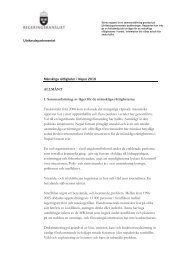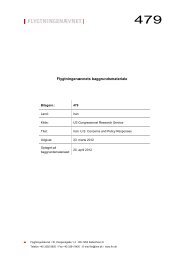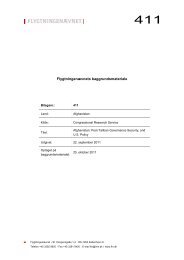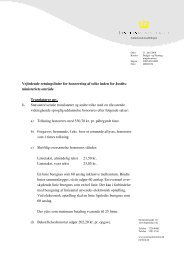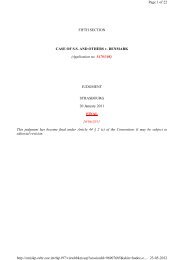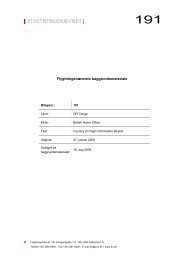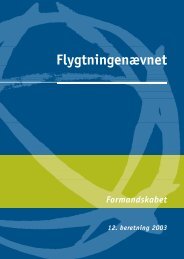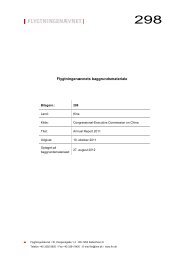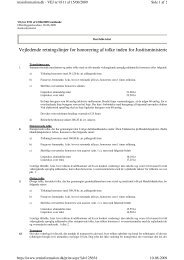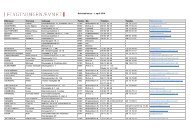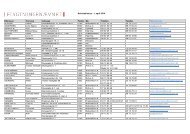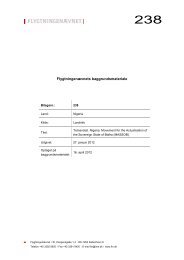Annual Report - National Human Rights Commission
Annual Report - National Human Rights Commission
Annual Report - National Human Rights Commission
You also want an ePaper? Increase the reach of your titles
YUMPU automatically turns print PDFs into web optimized ePapers that Google loves.
Annexure 8<br />
○ ○ ○ ○ ○ ○ ○ ○ ○ ○ ○ ○ ○ ○ ○ ○ ○ ○ ○ ○ ○ ○ ○ ○ ○ ○ ○ ○ ○ ○ ○ ○ ○ ○ ○ ○ ○ ○ ○ ○ ○ ○ ○ ○ ○ ○ ○ ○ ○ ○ ○ ○ ○ ○ ○ ○ ○ ○ ○ ○ ○ ○<br />
○<br />
rational and ethical practice, and sets and monitors quality standards and prices of<br />
services. This is distinct and superior compared to the Indian Medical Council in that<br />
it is not representative of professional doctors alone – but includes representatives<br />
of legal health care providers, public health expertise, legal expertise,<br />
representatives of consumer, health and human rights groups and elected public<br />
representatives. Also this could independently monitor and intervenein an effective<br />
manner.<br />
●<br />
Issuing <strong>National</strong> Operational Guidelines on Essential Drugs specifying the right of all<br />
citizens to be able to access good quality essential drugs at all levels in the public health<br />
system; promotion of generic drugs in preference to brand names; inclusion of all essential<br />
drugs under Drug Price Control Order; elimination of irrational formulations and<br />
combinations. Government of India should take steps to publish a <strong>National</strong> Drug<br />
Formulary based on the morbidity pattern of the Indian people and also on the<br />
essential drug list.<br />
●<br />
Measures to integrate <strong>National</strong> Health Programmes with the Primary Health Care<br />
system with decentralized planning, decision-making and implementation. Focus to<br />
be shifted from bio-medical and individual based measures to social,<br />
ecological and community based measures. Such measures would include compulsory<br />
health impact assessment for all development projects; decentralized and effective<br />
surveillance and compulsory notification of prevalent diseases by all health care providers,<br />
including private practitioners.<br />
●<br />
Reversal of all coercive population control measures, that are violative of basic human<br />
rights, have been shown to be less effective in stabilizing population, and draw away<br />
significant resources and energies of the health system from public health priorities. In<br />
keeping with the spirit of the NPP 2000, steps need to be taken to eliminate and prevent<br />
all forms of coercive population control measures and the two-child norm, which targets<br />
the most vulnerable sections of society.<br />
●<br />
Active participation by Union Health Ministry in a <strong>National</strong> mechanism for health services<br />
monitoring, consisting of a Central Health Services Monitoring and Consultative Committee<br />
to periodically review the implementation of health rights related to actions by the Union<br />
Government. This would also include deliberations on the underlying structural and policy<br />
issues, responsible for health rights violations. Half of the members of this Committee<br />
would be drawn from <strong>National</strong> level health sector civil society platforms. NHRC would<br />
facilitate this committee. Similarly, operationalizing Sectoral Health Services Monitoring<br />
Committees dealing with specific health rights issues (Women’s health, Children’s health,<br />
Mental health, Right to essential drugs, Health rights related to HIV-AIDS etc.)<br />
228<br />
<strong>National</strong> <strong>Human</strong> <strong>Rights</strong> <strong>Commission</strong> <strong>Annual</strong> <strong>Report</strong> - 2004-2005<br />
AR-Chapter-1-19-10-6-06.p65<br />
248<br />
7/17/06, 6:31 PM



